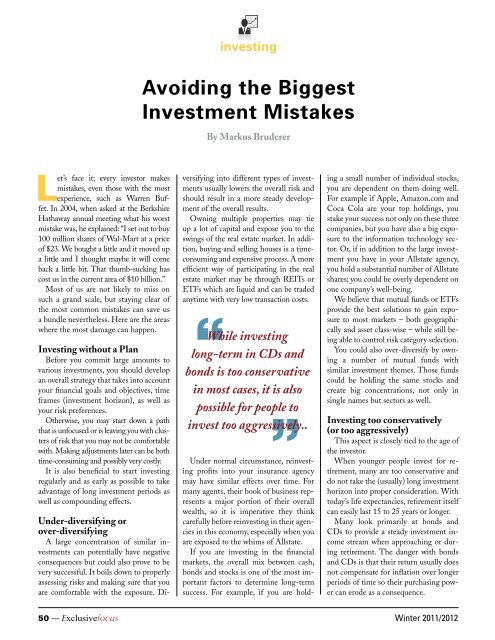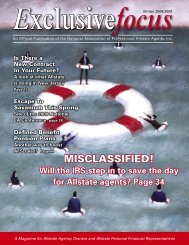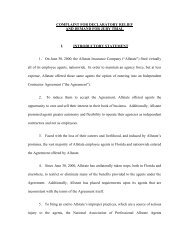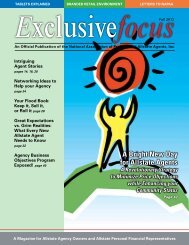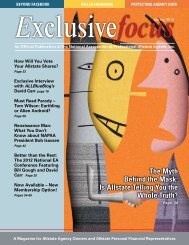who is the redheaded stepchild of allstate's Distribution system?
who is the redheaded stepchild of allstate's Distribution system?
who is the redheaded stepchild of allstate's Distribution system?
Create successful ePaper yourself
Turn your PDF publications into a flip-book with our unique Google optimized e-Paper software.
investing<br />
Avoiding <strong>the</strong> Biggest<br />
Investment M<strong>is</strong>takes<br />
By Markus Bruderer<br />
Let’s face it; every investor makes<br />
m<strong>is</strong>takes, even those with <strong>the</strong> most<br />
experience, such as Warren Buffet.<br />
In 2004, when asked at <strong>the</strong> Berkshire<br />
Hathaway annual meeting what h<strong>is</strong> worst<br />
m<strong>is</strong>take was, he explained: “I set out to buy<br />
100 million shares <strong>of</strong> Wal-Mart at a price<br />
<strong>of</strong> $23. We bought a little and it moved up<br />
a little and I thought maybe it will come<br />
back a little bit. That thumb-sucking has<br />
cost us in <strong>the</strong> current area <strong>of</strong> $10 billion.”<br />
Most <strong>of</strong> us are not likely to m<strong>is</strong>s on<br />
such a grand scale, but staying clear <strong>of</strong><br />
<strong>the</strong> most common m<strong>is</strong>takes can save us<br />
a bundle never<strong>the</strong>less. Here are <strong>the</strong> areas<br />
where <strong>the</strong> most damage can happen.<br />
Investing without a Plan<br />
Before you commit large amounts to<br />
various investments, you should develop<br />
an overall strategy that takes into account<br />
your financial goals and objectives, time<br />
frames (investment horizon), as well as<br />
your r<strong>is</strong>k preferences.<br />
O<strong>the</strong>rw<strong>is</strong>e, you may start down a path<br />
that <strong>is</strong> unfocused or <strong>is</strong> leaving you with clusters<br />
<strong>of</strong> r<strong>is</strong>k that you may not be comfortable<br />
with. Making adjustments later can be both<br />
time-consuming and possibly very costly.<br />
It <strong>is</strong> also beneficial to start investing<br />
regularly and as early as possible to take<br />
advantage <strong>of</strong> long investment periods as<br />
well as compounding effects.<br />
Under-diversifying or<br />
over-diversifying<br />
A large concentration <strong>of</strong> similar investments<br />
can potentially have negative<br />
consequences but could also prove to be<br />
very successful. It boils down to properly<br />
assessing r<strong>is</strong>ks and making sure that you<br />
are comfortable with <strong>the</strong> exposure. Diversifying<br />
into different types <strong>of</strong> investments<br />
usually lowers <strong>the</strong> overall r<strong>is</strong>k and<br />
should result in a more steady development<br />
<strong>of</strong> <strong>the</strong> overall results.<br />
Owning multiple properties may tie<br />
up a lot <strong>of</strong> capital and expose you to <strong>the</strong><br />
swings <strong>of</strong> <strong>the</strong> real estate market. In addition,<br />
buying and selling houses <strong>is</strong> a timeconsuming<br />
and expensive process. A more<br />
efficient way <strong>of</strong> participating in <strong>the</strong> real<br />
estate market may be through REITs or<br />
ETFs which are liquid and can be traded<br />
anytime with very low transaction costs.<br />
“<br />
While investing<br />
long-term in CDs and<br />
bonds <strong>is</strong> too conservative<br />
in most cases, it <strong>is</strong> also<br />
possible for people to<br />
invest too aggressively..<br />
“<br />
Under normal circumstance, reinvesting<br />
pr<strong>of</strong>its into your insurance agency<br />
may have similar effects over time. For<br />
many agents, <strong>the</strong>ir book <strong>of</strong> business represents<br />
a major portion <strong>of</strong> <strong>the</strong>ir overall<br />
wealth, so it <strong>is</strong> imperative <strong>the</strong>y think<br />
carefully before reinvesting in <strong>the</strong>ir agencies<br />
in th<strong>is</strong> economy, especially when you<br />
are exposed to <strong>the</strong> whims <strong>of</strong> Allstate.<br />
If you are investing in <strong>the</strong> financial<br />
markets, <strong>the</strong> overall mix between cash,<br />
bonds and stocks <strong>is</strong> one <strong>of</strong> <strong>the</strong> most important<br />
factors to determine long-term<br />
success. For example, if you are hold-<br />
ing a small number <strong>of</strong> individual stocks,<br />
you are dependent on <strong>the</strong>m doing well.<br />
For example if Apple, Amazon.com and<br />
Coca Cola are your top holdings, you<br />
stake your success not only on <strong>the</strong>se three<br />
companies, but you have also a big exposure<br />
to <strong>the</strong> information technology sector.<br />
Or, if in addition to <strong>the</strong> large investment<br />
you have in your Allstate agency,<br />
you hold a substantial number <strong>of</strong> Allstate<br />
shares; you could be overly dependent on<br />
one company’s well-being.<br />
We believe that mutual funds or ETFs<br />
provide <strong>the</strong> best solutions to gain exposure<br />
to most markets – both geographically<br />
and asset class-w<strong>is</strong>e – while still being<br />
able to control r<strong>is</strong>k category selection.<br />
You could also over-diversify by owning<br />
a number <strong>of</strong> mutual funds with<br />
similar investment <strong>the</strong>mes. Those funds<br />
could be holding <strong>the</strong> same stocks and<br />
create big concentrations, not only in<br />
single names but sectors as well.<br />
Investing too conservatively<br />
(or too aggressively)<br />
Th<strong>is</strong> aspect <strong>is</strong> closely tied to <strong>the</strong> age <strong>of</strong><br />
<strong>the</strong> investor.<br />
When younger people invest for retirement,<br />
many are too conservative and<br />
do not take <strong>the</strong> (usually) long investment<br />
horizon into proper consideration. With<br />
today’s life expectancies, retirement itself<br />
can easily last 15 to 25 years or longer.<br />
Many look primarily at bonds and<br />
CDs to provide a steady investment income<br />
stream when approaching or during<br />
retirement. The danger with bonds<br />
and CDs <strong>is</strong> that <strong>the</strong>ir return usually does<br />
not compensate for inflation over longer<br />
periods <strong>of</strong> time so <strong>the</strong>ir purchasing power<br />
can erode as a consequence.<br />
50 — Exclusivefocus Winter 2011/2012


